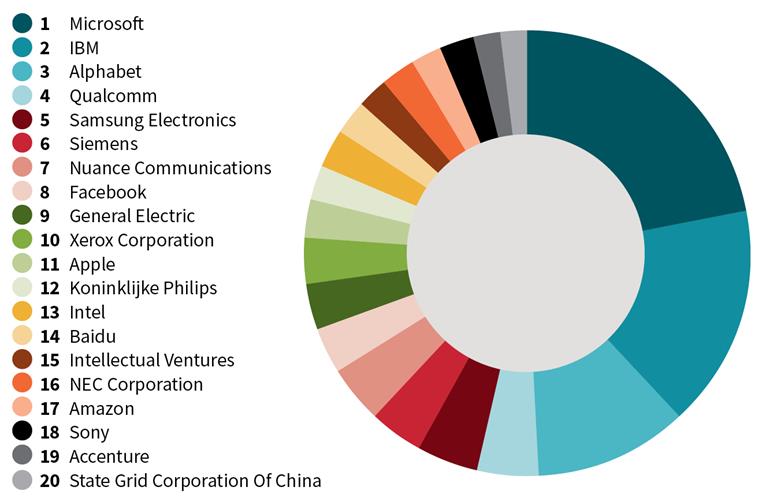Artificial intelligence (AI) represents a transformative force across multiple industries, driving innovation in areas such as customer service, healthcare, manufacturing, and transportation. Unlike the speculative depictions in science fiction, today’s AI technologies, while advanced, operate within defined parameters, relying on algorithms, neural networks, and deep learning systems. For IP litigation attorneys, understanding the nuances of AI-related intellectual property (IP) is critical, as the rapid evolution of this technology has led to a surge in patent filings and complex legal questions surrounding inventorship and patentability. Engaging a software expert witness or an AI expert witness can provide clarity in navigating these intricate cases.
Growth in AI Patent Filings
The landscape of AI intellectual property has seen exponential growth. According to the World Intellectual Property Organization, over 21,000 patents related to computer vision were filed in 2016 alone. AI robotics patents have grown at an annual rate of 265%, while control methods for AI technologies have seen comparable increases. This surge underscores the need for specialized expertise, such as an AI expert witness, to interpret the technical and legal intricacies of these filings in disputes.
Key trends include:
- Neural Networks: A marked rise in patent applications for neural network technologies, particularly in machine translation, reflects growing commercial interest. These systems enable computers to process and generate human-like language, a cornerstone of modern AI applications.
- Deep Learning: With an annual growth rate of 174.6%, deep learning patents are prominent, especially in speech recognition applications. This technology underpins advancements in voice-activated assistants and automated transcription services.
Industry-Specific AI IP Trends
AI patent filings vary across industries, with certain sectors leading the charge:
- Transportation: The transportation sector has experienced a 134% annual increase in AI-related IP filings, driven by developments in autonomous vehicles and navigation systems. These innovations require precise patent documentation, often necessitating a software expert witness to validate claims in litigation.
- Telecommunications: With an 84% annual rise, telecommunications leverages AI for enhanced speech recognition and virtual assistants, integral to modern communication platforms.
- Personal Computing: A 36% annual increase in filings highlights AI’s role in improving user interfaces and device functionality, creating new opportunities for IP protection.
Governmental Focus on AI IP
Governments worldwide are scrutinizing AI intellectual property. In 2020, the UK Intellectual Property Office issued guidance on AI-related patents, emphasizing two key issues: whether AI can be recognized as an inventor and how AI-generated inventions fit within existing legal frameworks. Current UK law requires a human inventor, creating challenges for AI-driven innovations. Exclusions in UK patent law, such as those for mathematical methods, may further complicate filings, requiring expert analysis from an AI expert witness to address eligibility disputes.
Similarly, the European Patent Office has clarified that AI cannot be named as an inventor, reinforcing the human-centric nature of patent law. These rulings impact how companies approach AI patent strategies, often necessitating detailed technical testimony in litigation.
Legal Implications for IP Litigation
For IP litigation attorneys, AI patents present unique challenges. The complexity of AI technologies—spanning neural networks, deep learning, and control systems—demands precise technical understanding. A software expert witness can dissect the functionality of disputed technologies, while an AI expert witness can provide insights into the novelty and inventiveness of AI-driven innovations. These experts are instrumental in clarifying whether a patent meets statutory requirements or infringes on existing IP.
Moreover, the question of AI as an inventor raises novel legal debates. While AI cannot currently hold inventorship status, its role in generating patentable outputs blurs traditional boundaries. Attorneys must stay informed about evolving regulations, such as those from the United States Patent and Trademark Office, which continues to evaluate AI’s impact on patent law.
Conclusion
The rapid growth of AI intellectual property underscores its importance in modern innovation. With patent filings surging in neural networks, deep learning, and industry-specific applications, companies must act swiftly to secure their IP rights. For IP litigation attorneys, partnering with a software expert witness or AI expert witness is essential to navigate the technical and legal complexities of AI patents. As the field evolves, staying abreast of global regulations and trends will be critical for effective IP protection and dispute resolution. For expert guidance in AI and machine learning patent litigation, contact the specialists at Sidespin Group.

